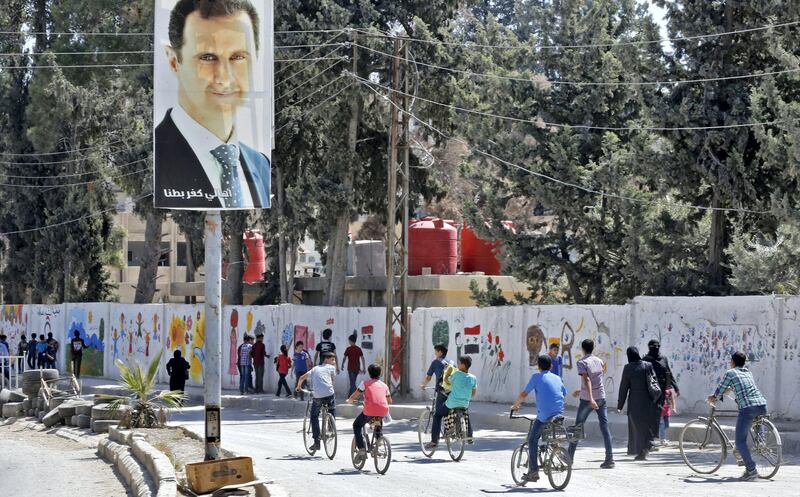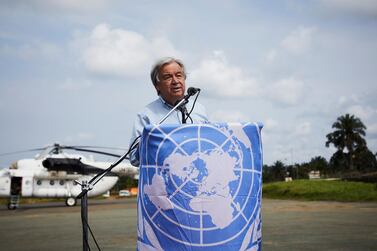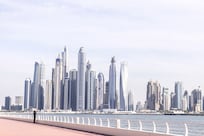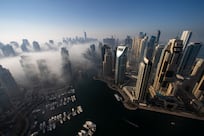Syria's civil war, born in the tumult of the 2011 Arab uprisings, has sealed its place in the ranks of global conflicts seemingly without end.
The country stands divided among government-controlled areas, rebel enclaves and zones where troops from the US, Turkey, Iran and Russia hold territory.
Untangling the war's complicated patchwork of rival alliances and defusing tension, including the grievances of ethnic Kurds near the Turkish border, remain stumbling blocks to Syria and its people being reconciled.
But after eight years of fighting, the deaths of more than half a million civilians and the displacement of millions more, there is a reluctant agreement among world powers that the war has one victor: President Bashar Al Assad.
What remains missing is a political endgame capable of delivering peace.
"Assad has won this war but it won't end until he goes," a senior western diplomat on the UN Security Council told The National.
“His regime still holds the fear that if they compromise they will lose power. It's always been all or nothing for them.”
The Assad regime is unquestionably on the rise. The president's one-time opponents have either been killed, imprisoned or exiled.
After years of deadlock at the UN, where Russia has shielded Syria from international action, diplomacy has failed in the face of a military campaign the West was not willing to counter.
The last rebel-held bastion of Idlib is the regime's current objective. For Mr Al Assad's forces, taking the north-western province is considered a matter of time and tactics rather than a battle that could ever be lost.
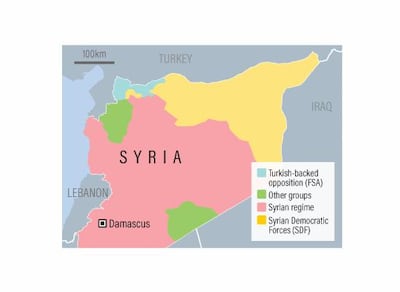
The paradox of the Syrian leader's survival, however, is that having thus far withstood international pressure to stand down, the biggest risks to his future may now lie within his own borders.
Publicly, western powers remain committed to a UN peace effort in Syria that would see the government end the war and agree to reforms, including a new constitution and elections.
The process could theoretically culminate in Mr Al Assad's departure and political rehabilitation for Syria, even if it gives the president a decisive hand in picking a successor.
Under such a scenario, Syria might be granted billions of dollars in international funding for post-war reconstruction.
But privately, diplomats who know the Assad regime believe the western plan remains fundamentally flawed as it is based on the same ill-founded hopes that resulted in years of failure to stop the Syrian president from waging war on his own people – that he would bow to foreign pressure and stand down.
Consequently, some diplomats are raising the possibility of alternative outcome that could end the regime's rule, in an attempt to persuade Mr Al Assad to engage politically.
The scenarios have been discussed with Russian diplomats, with the aim of the theories reaching the ears of the Syrian president and his inner circle in Damascus.
One is the possible assassination of the Syrian president by political or religious opponents.
The second is a new domestic insurgency against the continued unchallenged rule of Mr Al Assad's minority Alawite sect.
And the third is a renewed threat of US and European military action against Syria if government forces use chemical weapons again.
“The fighting in Idlib could be over by Christmas or it could take another two or three years,” said an adviser to a leading member of the Security Council.
“But regardless, Syria will remain a basket case. There will be terrorist attacks, bombs going off, assassinations and terrorist groups popping up for decades.
"We are trying to get this point across to Assad that it's in his long-term interest to talk. He takes risks by occasionally appearing in public. He could be killed at any moment.”
The future of the Syrian president has long preoccupied those given the task of ending the war.
Publicly, western governments have moved away from wanting Mr Al Assad removed from power. Privately, they consider his exit desirable, although unlikely.
Persuading the Syrian president into dialogue could be a forlorn quest.
UN officials say he remains locked in a “bunker mentality”, deeply suspicious of any ideas put forward by countries who have long wished him gone.
Having bombarded Idlib since late April, causing almost half a million people to leave their homes, peace seems far from Mr Al Assad's thoughts.
A ceasefire has for two weeks limited the bombing but it was brought about after Russia came under pressure in the Security Council over claims that its planes had bombed hospitals, schools and other civilian sites on Syria's behalf.
For the Syrian government, wiping out rebels in Idlib is a task that has merely been delayed.
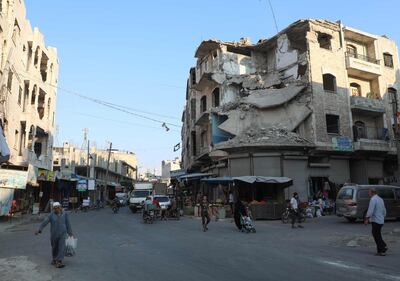
But the threat of assassination is likely to grow, some diplomats say, pointing to a historical parallel.
The Syrian president's late father, Hafez Al Assad was targeted, albeit unsuccessfully, by Muslim Brotherhood supporters in a machinegun and grenade attack in 1980.
The attempt to kill him was part of an Islamist uprising against the Assad-led Baath Party and Alawite elite.
The revolt was met by a huge crackdown that resulted in the deaths of thousands of government opponents in the Hama massacre in 1982.
The uprising and the paranoia it infused in the regime has shaped its repression of opponents ever since.
But even if Mr Al Assad eventually reclaims control of all sovereign territory, most of Syria's population, disenfranchised and angered by the deaths and destruction of the war, will lie in wait.
“Essentially, it could be a domestic insurgency,” said a UN official involved in Syria policy. “The 65 per cent of Syrians who are Sunni Muslim are going to be around one way or another.
"Too many of them have had brothers, fathers, sisters or mothers or children tortured, murdered or disappeared. They're not going to let that go.”
The lack of an economic dividend, given the presumed ending of a war economy without foreign assistance as at least a temporary replacement, could also cause dissent within the regime.
“There will be increased demands for some sort of payback,” said the official. “He could end up being brought down by his own side.”
Having failed in the early years of the war to persuade Mr Al Assad to leave power, the West's effort to end the fighting is now led by Geir Pedersen, a Norwegian diplomat. He is the fourth UN special envoy to Syria since the war began in 2011.
On Wednesday, UN Secretary General Antonio Guterres confirmed that Mr Pedersen was finalising the terms of a constitutional committee that has long been promoted as a gateway to political change in Syria.
Its members, drawn from government, opposition and others outside politics, will be given the task of writing a new constitution as part of a peaceful solution to end the war.
Over the past nine months Mr Pedersen has held negotiations with the Assad regime, Syria's exiled opposition, the US, Arab states and European officials.
The formation of the constitutional committee could herald an achievement, but only if it is implemented and its members are allowed to do their job, officials say.
In his discussions with Damascus, Mr Pedersen has also told the government that there will be no new beginning in Syria without a reconciliation process.
Comparisons have been drawn with the peace efforts undertaken in the 1990s in Northern Ireland and in Bosnia. Both conflicts ended long-running violence between rival religious groups where trust had completely broken down.
Getting Mr Al Assad to agree is a tall order.
For the past eight years, he has suppressed dissent and clung to power through force.
Iran and Russia, unlike the US and other foreign powers, were willing to expend military resources to protect their strategic interests and back the Syrian president.
In contrast, there remains deep cynicism among diplomats that the UN effort can succeed, given that Mr Pedersen's chances are only as good as the influence the US and other powers are willing to exert to agree with his plans.
“The regime is feeling comfortable and is in even less of a mood to compromise than probably at any point in the conflict,” a European diplomat said.
“We underestimated Assad's sheer brutality and the lengths he was willing to go to exert that brutality and stay in power.
"It is deeply depressing but all the moments where we could have changed things for the better in Syria are behind us now.”
